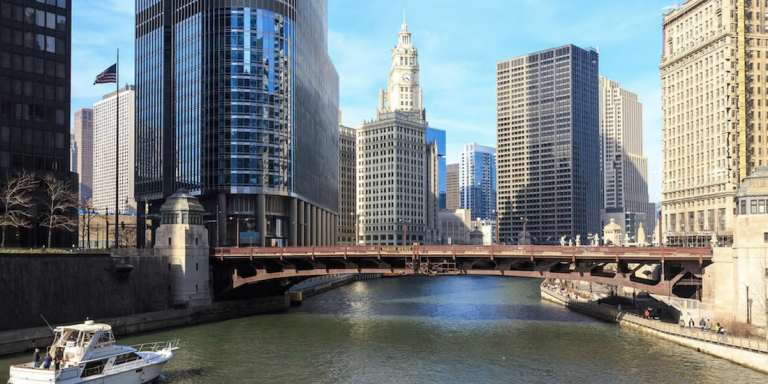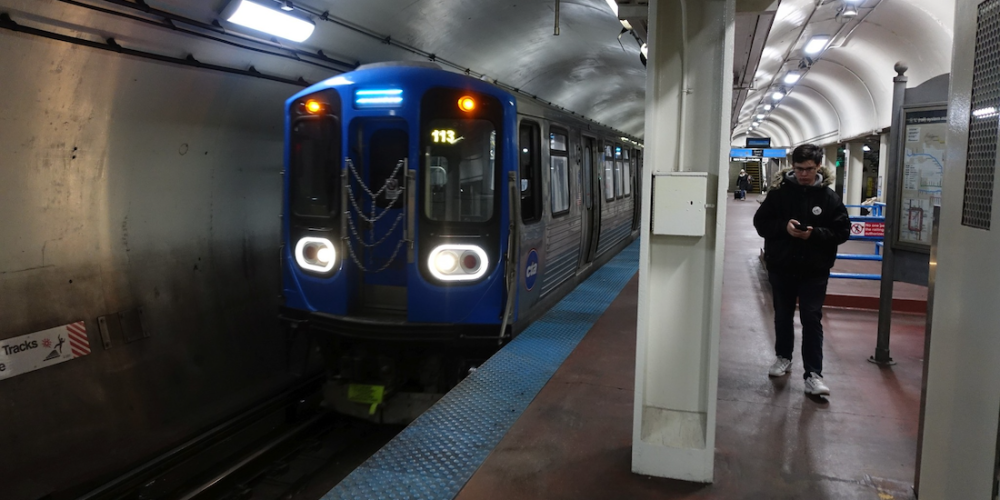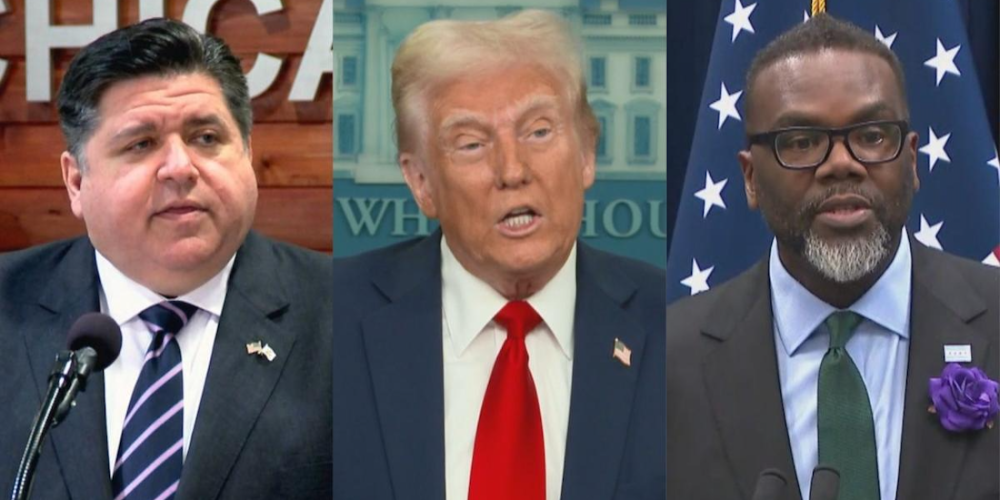
Federal Review Targets Race-Based Practices in Key Projects Amid Shutdown Standoff

New York, N.Y. — In a move that has ignited fresh controversy over federal funding and equity policies, the Trump administration announced on October 3, 2025, that it is withholding US$2.1 billion earmarked for two major Chicago transit initiatives. The decision, framed as a safeguard against unconstitutional contracting preferences, comes as the U.S. government shutdown enters its third day, with both parties trading accusations of fiscal irresponsibility.
The pause affects the Chicago Transit Authority‘s (CTA) Red Line Extension and the Red and Purple Modernization Project, both critical to modernizing the city’s aging public transportation network.
Russell Vought, director of the Office of Management and Budget (OMB), disclosed the action in a post on X, stating that the funds have been “put on hold to ensure funding is not flowing via race-based contracting.”

This intervention underscores the administration’s broader campaign to dismantle what it describes as discriminatory practices in infrastructure awards, a priority amplified by the ongoing budget impasse in the U.S. Congress.
The U.S. Department of Transportation (DOT) has initiated an administrative review of the projects, prompted by a newly issued interim final rule that prohibits race- and sex-based contracting requirements in federal grants.
Officials emphasized that the review aims to promote merit-based allocation, allowing projects to proceed once compliance is verified.
However, with federal agencies operating on skeleton staffs due to the shutdown, timelines remain uncertain, potentially delaying construction timelines by months or longer.
This development follows similar freezes on funding for New York City’s Second Avenue Subway and Hudson Tunnel projects, totaling US$18 billion, as well as the termination of US$7.56 billion for 223 energy initiatives across 16 Democratic-led states.
Critics, including Democratic lawmakers, have decried the actions as punitive measures designed to pressure opponents into conceding on spending cuts, transforming routine infrastructure support into a political bargaining chip.
The Projects at Stake: Vital Links for Chicago’s South Side
At the heart of the dispute lie two ambitious undertakings that promise to reshape Chicago‘s transit landscape, particularly in underserved communities. The Red Line Extension, a 5.6-mile (9-km) southward push from its current terminus at 95th Street to 130th Street, would introduce four new stations at 111th, 115th, 127th, and 130th Streets. First conceived in the 1980s and formalized as the locally preferred alternative in August 2009, the project has navigated decades of planning hurdles, environmental reviews, and funding battles.
Estimated at a total cost of US$5.75 billion, the extension received a pivotal US$1.97 billion infusion from the Bipartisan Infrastructure Law in January 2025, enabling the CTA to break ground on preliminary work. Proponents argue it will serve approximately 30,000 daily riders in predominantly Black and low-income neighborhoods, fostering economic development through improved access to jobs, education, and healthcare. “This isn’t just about tracks and trains,” noted Dorval Carter, CTA president, in a January statement celebrating the funding milestone. “It’s about equity and opportunity for communities long overlooked by urban planning.”
Complementing this is the Red and Purple Modernization Project, a US$2.3 billion overhaul of aging infrastructure along the Red and Purple Lines. Spanning 9 miles (14.5 km) from Howard to 95th Streets, it includes signal upgrades, track rehabilitation, and station improvements to boost reliability and capacity by 30%. Federal contributions here total roughly US$130 million, part of the paused US$2.1 billion package. Together, these initiatives represent a cornerstone of Mayor Brandon Johnson‘s vision for a more inclusive Chicago, with projections estimating 10,000 new jobs during construction and long-term reductions in traffic congestion equivalent to removing 50,000 vehicles annually.
The freeze threatens to stall momentum at a delicate juncture. Groundbreaking ceremonies for the Red Line Extension occurred just nine months ago, with early utility relocations underway. Delays could inflate costs by 5-10% annually due to inflation and labor shortages, according to transit experts, while exacerbating reliability issues on lines that already suffer 20% on-time performance deficits during peak hours.

Scrutiny of Race-Based Contracting: Legal and Policy Fault Lines
The administration’s rationale hinges on longstanding grievances with affirmative action in public contracting, a practice rooted in the Civil Rights Act of 1964 but increasingly vulnerable to judicial scrutiny. Chicago, like many U.S. municipalities, mandates participation goals for Disadvantaged Business Enterprises (DBEs), which prioritize firms owned by socially and economically disadvantaged individuals, often categorized by race and ethnicity. For the Red Line projects, the CTA has set targets of 32% DBE participation, drawing from a pool where minority- and women-owned businesses comprise about 40% of certified vendors.
DOT officials contend these quotas violate the Fifth Amendment‘s equal protection clause, echoing the U.S. Supreme Court’s 2023 decision in Students for Fair Admissions v. Harvard, which curtailed race-conscious admissions in higher education. “Federal dollars must flow based on merit, not identity,” a DOT spokesperson asserted in the agency’s rule announcement. The interim measure, effective immediately, requires grantees to certify compliance or face reimbursement halts—a policy the administration vows to enforce rigorously across all infrastructure programs.
Legal challenges to such programs predate the current impasse. In Chicago, a 2022 lawsuit by the American Alliance for Equal Rights targeted DBE preferences in O’Hare International Airport expansions, alleging reverse discrimination against non-minority firms. Though dismissed on procedural grounds, it spotlighted tensions: proponents cite data showing DBE goals increase minority procurement from 10% to 25% without compromising quality, while opponents point to studies indicating 15% cost premiums in some cases. Nationally, the U.S. Commission on Civil Rights has warned that post-SFFA rulings could invalidate 70% of state and local set-aside programs, potentially reshaping US$100 billion in annual contracts.
For the CTA, the review process involves auditing bid documents, subcontractor lists, and waiver requests—tasks complicated by the shutdown’s furlough of 800 DOT personnel. If violations are found, funds could be redirected or clawed back, a scenario that Illinois Governor J.B. Pritzker labeled “hostage-taking” in a preliminary statement, vowing legal recourse if delays persist beyond 60 days. See: J.B. Pritzker of Illinois: A Progressive Philanthropist (July 10, 2023)

Political Ramifications: Shutdown as Leverage in Budget Wars
This funding pause emerges against the backdrop of a fractious government shutdown that began at midnight on September 30, 2025, after Senate Republicans blocked a bipartisan continuing resolution. The standoff pits President Donald Trump‘s demands for US$50 billion in discretionary spending reductions against Democratic insistence on protecting social programs and clean energy investments. With the House canceling votes through next week and the Senate adjourning until Monday, October 6, prospects for resolution appear dim, potentially idling 2 million federal workers and disrupting services from national parks to Social Security payments.
Administration allies portray the infrastructure reviews as principled governance, not retaliation. Vought, a architect of Project 2025‘s fiscal blueprint, argued on X that Democrats’ “budget hostage-taking” necessitates such safeguards to prevent “woke” policies from siphoning taxpayer resources. Yet the geographic pattern—targeting blue strongholds like Chicago (85% Democratic in 2024 midterms) and New York (78%)—has fueled charges of partisanship. Senate Minority Leader Chuck Schumer decried the moves as “extortion,” estimating US$25 billion in cumulative impacts on Democratic districts.
Analysts see echoes of the 2018-2019 shutdown, when Trump withheld US$800 million from California wildfire aid, drawing rebukes from the Government Accountability Office. A Pew Research Center poll conducted October 2 found 62% of respondents blaming congressional Democrats for the current impasse, up 8% from September, though urban voters in affected cities registered 55% disapproval of the pauses. As negotiations stall, the White House has signaled readiness for further cuts, including potential furloughs in the Environmental Protection Agency and Department of Housing and Urban Development.
Local Impacts and Stakeholder Reactions: A City on Edge
In Chicago, the announcement rippled through city hall and transit advocates, amplifying anxieties over mobility and equity. The Red Line Extension was hailed as a triumph of the Biden-Harris era’s infrastructure push, with community leaders crediting it for projected US$3.5 billion in economic ripple effects over 25 years, including 4,000 permanent jobs. “These projects aren’t luxuries—they’re lifelines for working families,” said Alderman Pat Dowell, whose ward encompasses the extension corridor, in a press conference October 3. The CTA, serving 1.5 million daily riders, faces immediate cash-flow strains, with officials warning of deferred maintenance that could spike breakdowns by 15%.
Business groups, including the Building Trades Council, expressed mixed sentiments: while supportive of anti-discrimination reviews, they cautioned against politicizing essential work. “Merit matters, but so does timely funding,” remarked council executive Bob Reiter. Environmental advocates, meanwhile, highlighted the projects’ role in cutting emissions by 20% along the corridor through modal shifts from cars.
As the shutdown persists, Chicago joins a roster of cities bracing for fallout. With federal reimbursements frozen, the CTA may tap reserves or seek state bridges, but Illinois‘s US$50 billion budget already strains under pension obligations. Broader implications loom for national transit: the American Public Transportation Association estimates that unresolved pauses could jeopardize 500,000 construction jobs nationwide by year’s end.
In the end, this episode encapsulates the fragility of U.S. infrastructure financing, where policy ideals collide with political realities. As Congress reconvenes, the fate of Chicago‘s tracks—and the riders who depend on them—hangs in the balance, a stark reminder that progress often travels at the speed of compromise.
Trump Attacks Cities: Pauses $2.1 Billion Chicago Transit Funds (Oct. 3, 2025)
Summary
In a bold escalation of the 2025 government shutdown, the Trump administration has frozen US$2.1 billion for Chicago’s Red Line Extension and modernization projects, citing race-based contracting concerns. As Democratic-led cities bear the brunt, stakeholders warn of economic setbacks and equity erosion. With Congress deadlocked, the pause threatens decades of planning, underscoring tensions between merit-based reforms and inclusive development goals.
#ChicagoTransit #TrumpShutdown #InfrastructureFunding #RaceBasedContracting #GovernmentImpasse
TAGS: Chicago, Infrastructure, Trump Administration, Government Shutdown, Transit Projects, Affirmative Action

Facebook Post: The Trump administration’s pause on US$2.1 billion for Chicago’s vital transit projects raises alarms over equity and economy. Dive into our analysis of the Red Line Extension’s uncertain future amid the shutdown. What does this mean for urban mobility? Read more: [link to article] #ChicagoTransit #InfrastructureFunding
Instagram Post: Frozen tracks, stalled progress: Trump’s US$2.1B hold on Chicago’s Red Line Extension hits South Side hard. Explore the politics behind race-based contracting reviews. Swipe for key facts. Link in bio. #TrumpShutdown #ChicagoTransit
LinkedIn Post: As the U.S. government shutdown intensifies, the Trump administration’s withholding of US$2.1 billion for Chicago infrastructure underscores tensions in federal contracting. This affects critical transit upgrades, with implications for job creation and urban equity. Professionals in policy and construction: How might this reshape grant compliance? Full story: [link to article] #Infrastructure #PublicPolicy #GovernmentShutdown
X / Twitter Post: Trump admin halts $2.1B Chicago transit funds over race-based contracting—Red Line Extension in limbo as shutdown drags on. Equity vs. merit? Our deep dive: [link to article] #ChicagoTransit #TrumpShutdown (147 characters)
BlueSky Post: In the 2025 shutdown saga, Trump’s freeze on Chicago’s $2.1B transit projects spotlights contracting debates. Red Line delays could cost jobs and access. Balanced take here: [link to article] #InfrastructureFunding #GovernmentImpasse